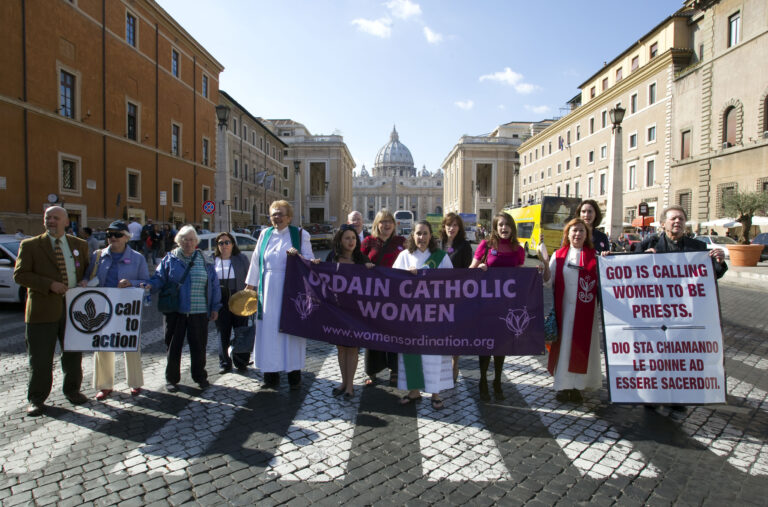The Continental Phase of the synodal process has concluded, and the Vatican has been clear that much of what came up in the various reports falls to local parishes and dioceses to implement.
Hierarchical Church
One of the dangers, of course, in a hierarchical Church is that one is always looking up for direction rather than discerning and looking around and realising what God is saying in and through the People of God. At least in some of the reports, many people seem to have felt that their local parish is not welcoming enough to people they describe as being on the margins.
I would respectfully suggest that there is very little that Pope Francis can do about that. In fact, I’ll go further – there is nothing he can do about that, absolutely nothing. If the local people cannot come together and work out how to make their parish more welcoming, then they might as well just lock the doors of the church and get on with something else.
The Vatican’s synod office in passing the ball back to parishes and dioceses has also made it clear that there are many things in the Church that fall to the universal Magisterium and are not the subject of local discussions which give the wrongful impression that everything is up for debate. This false idea will do nothing to renew and reform the Church, but only raise unrealistic hopes and leave people more disappointed.
The simple fact is that the Catholic Church does not believe itself to possess the authority to ordain women, and no amount of desire from some sections or focus groups to change that doctrine will change the identity – that fundamental reality. Perhaps it is useful to set out the meaning of the terms we use rather than assuming that everyone is versed in Church jargon. We need look no further than the Second Vatican Council (1962-65) for inspiration.
When we talk about the Magisterium, we mean the living teaching office of the Church. It is the Magisterium that has the task of giving an authentic interpretation of the Word of God as found in Scripture and in Tradition. Vatican II (Dei Verbum) insists that this teaching office “is exercised in the name of Jesus Christ” and that it “is not above the Word of God”.
Divine wellspring
According to Vatican II, both Scripture and Tradition flow from “the same divine wellspring” and unite to form a single reality and, the council teaches, they tend towards “the same end”. To put it simply, Sacred Scripture is the Word of God as written down under the inspiration of the Holy Spirit.
Sacred Tradition “takes the Word of God entrusted by Christ the Lord and the Holy Spirit to the Apostles, and hands it on to their successors in its full purity”. Scripture and Tradition, which “are to be accepted and venerated with the same sense of loyalty and reverence” constitute “a single deposit of the Word of God, which is entrusted to the Church”.
So, from a theological point of view, Scripture, the doctrinal tradition, and the sacramental practice of the Church down through the centuries provide the sources for Catholic theology in discerning God’s will with regard to the priesthood. But they can only be understood as a single theological lens and by any measure, that lens does not point in the direction of the Church suddenly denying its own inner reality and deciding to ordain women.
The matter is, as Pope Francis has been at pains to point out, settled with St John Paul II insisting in Ordinatio Sacerdotalis in 1994 that “the Church has no authority whatsoever to confer priestly ordination on women and that this judgment is to be definitively held by all the Church’s faithful”. But how do we square this with the very real perception that it is the Church’s failure to ordain women to the priesthood that is at the heart of the alienation undoubtedly felt by many women?
I think there has been a failure of the Church to teach what it teaches. There has also been a failure of theology in the public square. The Synod consultation phase found that many Catholic teachings were poorly followed, poorly understood or both.
How many people, I wonder, firm in their rejection of the Church’s teaching on the priesthood have taken the time to immerse themselves in that teaching? How many others have gone looking and found the Church in the presence of its minister either unwilling or unable to answer?
Present
No-one should fear questions around the ordination of women (or anything else) in the context of our present synodal journey. But people must be willing to engage with these questions and answer them and people must be willing to see things from a different perspective.
Otherwise, we simply end up with the pre-defined answers to our own narrow questions rather than coming to a deeper understanding of the faith – one which sees ministry as service rather than power.
Lastly, we must be careful of falling in to the trap of being what Pope Francis has called a ‘self-referential Church’ always obsessed with its own structures, committees and the exercise of power. Such traps are the heart of clericalism and do nothing to make the Church missionary and one that goes out rather than huddles together in sacristies.
Michael Kelly is Editor of The Irish Catholic newspaper.



